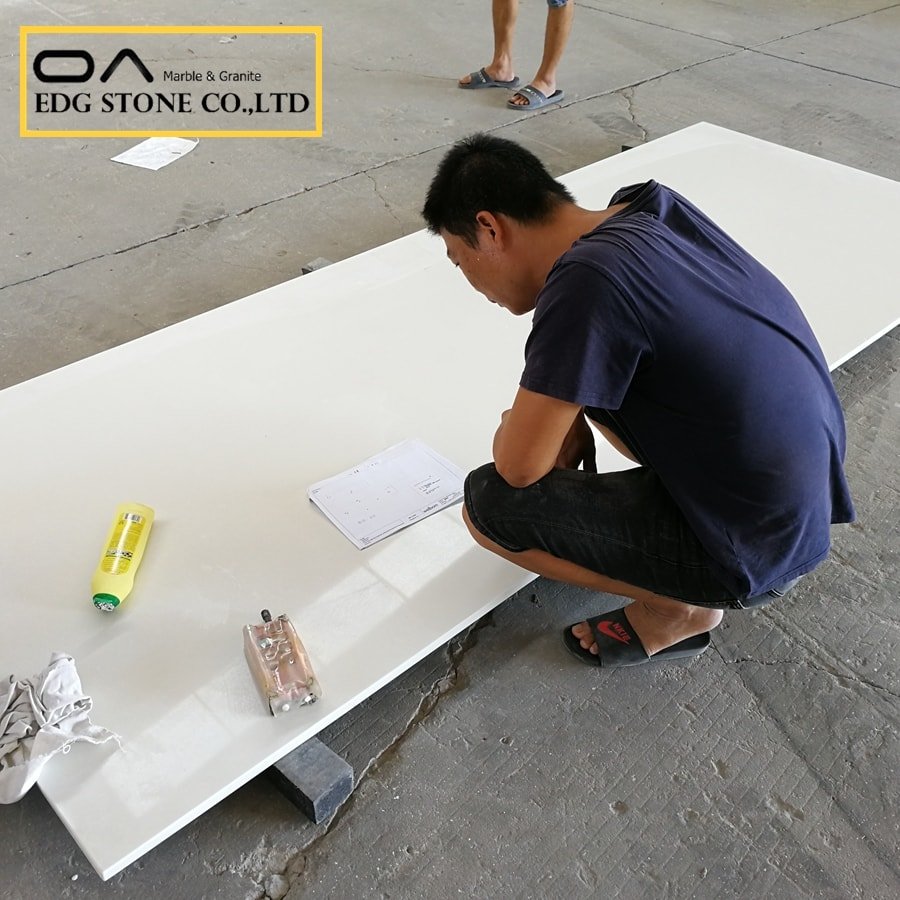
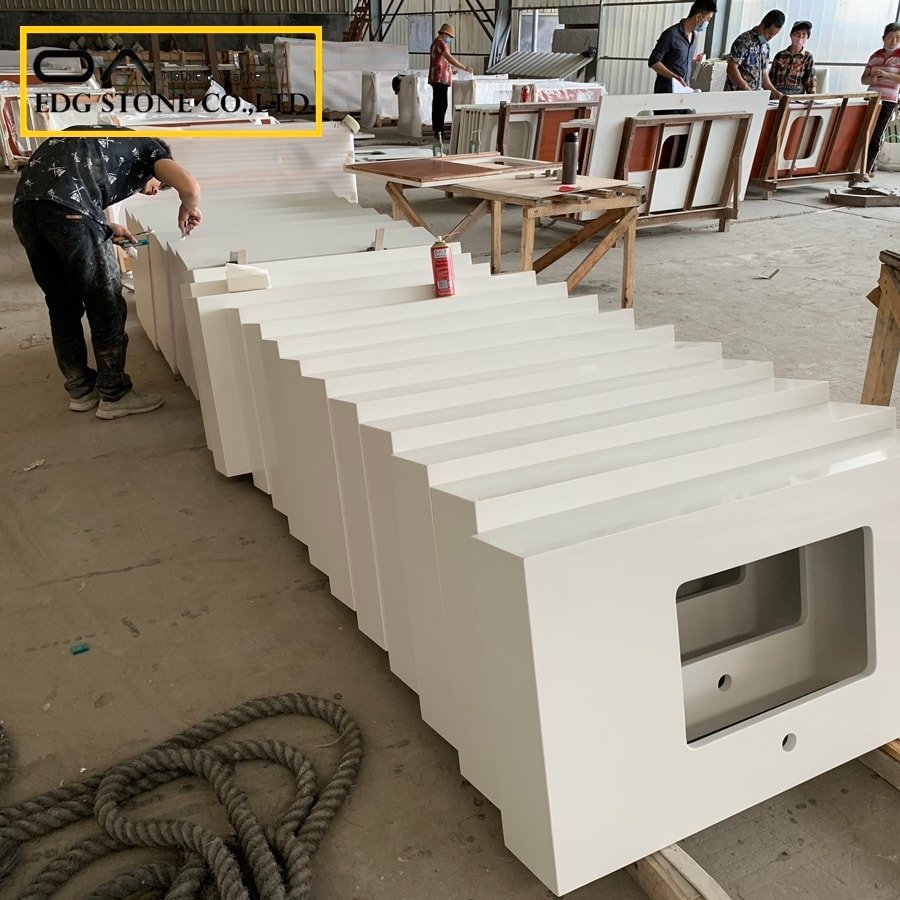
1) What “quartz” means here — engineered countertops vs natural crystals
Table of Contents
Toggle- 1) What “quartz” means here — engineered countertops vs natural crystals
- 2) Daily cleaning — keep it minimal and effective
- 3) Disinfecting quartz surfaces — follow CDC & EPA guidance
- 4) Stain removal — common stains and how to fix them
- 5) Cleaning quartz sinks & composite basins
- 6) How to clean natural quartz crystals, rose quartz, clear quartz, and raw quartz
- 7) What to avoid — products, tools, and mistakes
- 8) Homemade quartz countertop cleaner recipes (safe & effective)
- 9) Manufacturer, factory & wholesale cleaning product notes (purchase intent keywords)
- Semantic closure: How / Why / What / Options / Considerations (AI-first summary)
- 11) FAQ — Google hot-search FAQs
When people search “how to clean quartz stone,” they mean two different things:
Engineered quartz (quartz countertops/quartz stone slabs): manufactured slabs made from ~90–95% crushed quartz bound with polymer resins and pigments. These are non-porous, durable household surfaces with specific manufacturer care instructions.
Natural quartz/quartz crystals (rose quartz, clear quartz, raw quartz specimens): mined mineral specimens or gemstones; they require gentler, sometimes different care (and can be light-sensitive or react to acids differently).
Knowing which you have determines safe cleaners and methods.
2) Daily cleaning — keep it minimal and effective
For engineered quartz (countertops and composite sinks):
Recommended everyday routine:
Wipe spills promptly with a microfiber cloth or soft sponge.
Use warm water + a few drops of mild dish soap (Dawn or similar)—spray, wipe, and dry. This simple method is what most manufacturers (Cambria, Wilsonart, Caesarstone) recommend for daily use.
For light, greasy residue, a standard non-abrasive all-purpose cleaner is usually acceptable—wipe and dry to avoid streaks.
Why this works: engineered quartz is nonporous, so dirt and common kitchen liquids won’t penetrate; surface cleaning removes food residues, oils, and most stains without harsh chemicals.
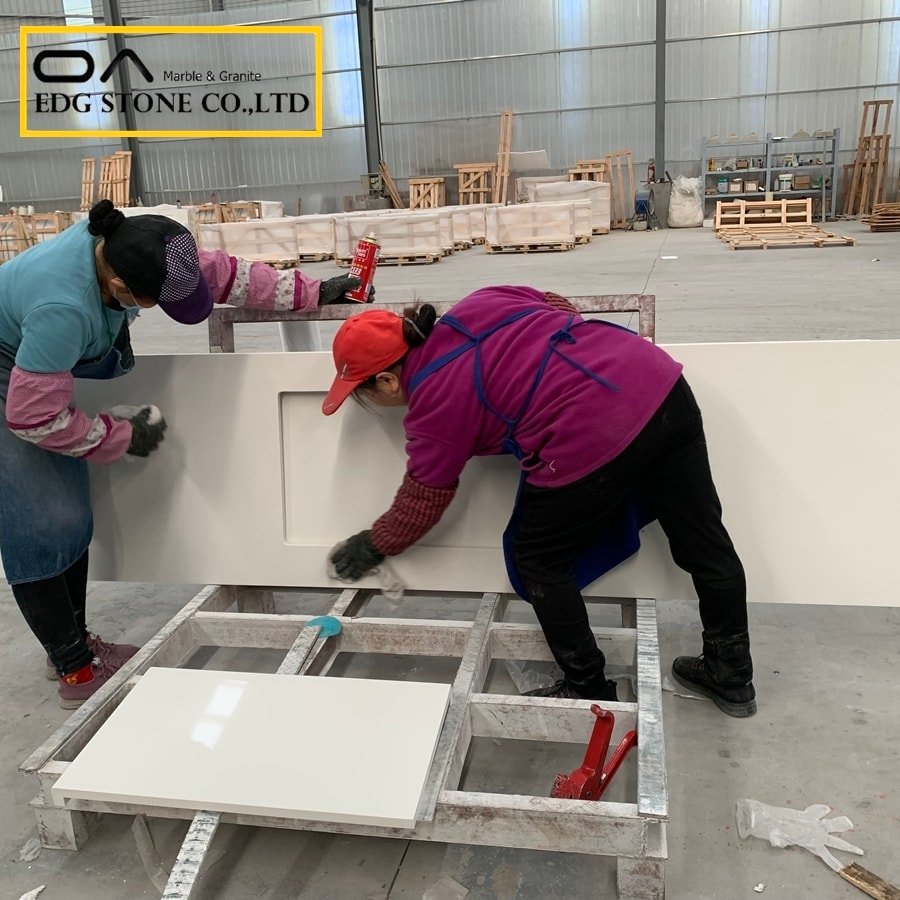
3) Disinfecting quartz surfaces — follow CDC & EPA guidance
If you need to disinfect (e.g., after raw meat handling, illness):
Clean first (soap + water) to remove dirt. Then use an EPA-registered disinfectant from the EPA List N or follow CDC guidance on home disinfection. Many List N products (quaternary ammonium, hydrogen peroxide, sodium hypochlorite/bleach) are labeled for hard nonporous surfaces; follow label directions (contact time, dilution, rinse instructions).
70% isopropyl alcohol is commonly used for quick surface disinfection and is an acceptable option for hard, nonporous surfaces when used properly and allowed to evaporate.
Manufacturer notes & warranty: Some quartz brands caution against repeated or prolonged use of strong chlorine bleach or oven cleaners because they can affect resins or color over time—if you must use such products, use diluted solutions, follow the fabricator’s guidance, and rinse thoroughly. Check the manufacturer’s care page for product-specific guidance.
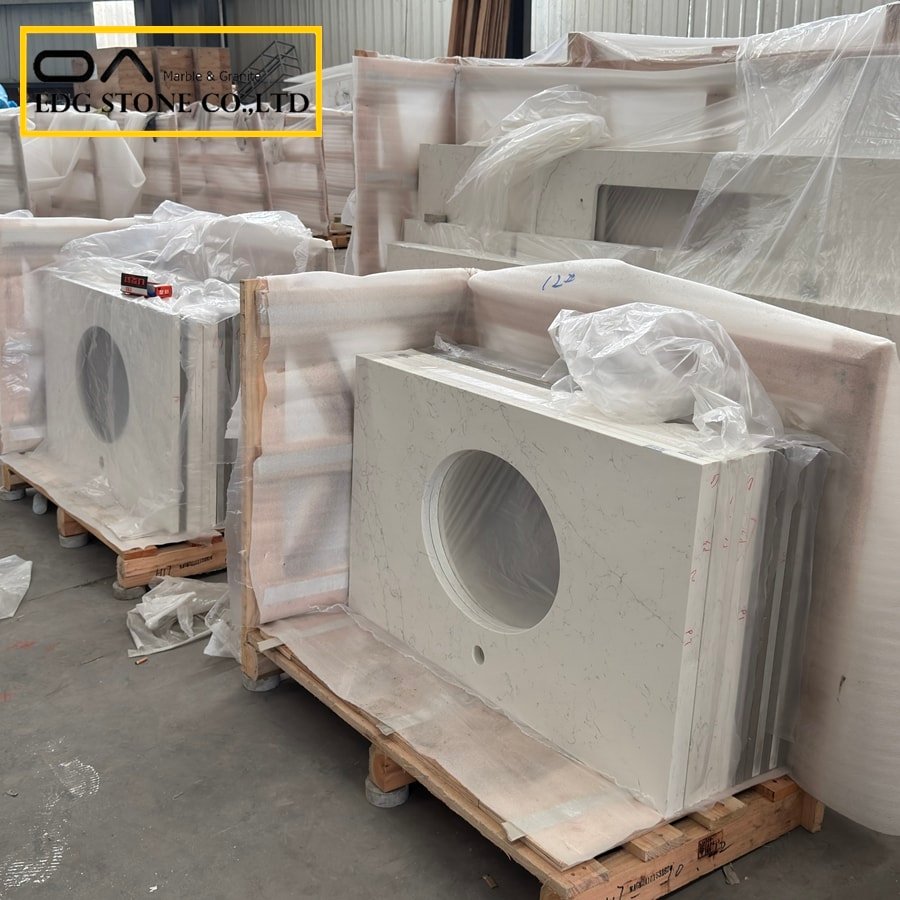
4) Stain removal — common stains and how to fix them
Important: Always test any product in an inconspicuous spot first and follow manufacturer guidance.
A. Fresh spills (wine, coffee, citrus, tomato)
Wipe immediately with warm, soapy water. If residue remains, apply a mild non-abrasive cleaner and gently wipe. Rinse and dry.
B. Sticky or gummy residues (adhesive, sugar spills)
Soak a cloth in warm, soapy water and lay it on the spot for a few minutes to soften residue; gently scrape with a plastic scraper (not metal). Repeat and rinse.
C. Dried paint, caulk, or epoxy
Use a plastic scraper to lift. If necessary, use a manufacturer-approved solvent (refer to your quartz brand); solvent contact should be brief, followed by immediate rinsing. Avoid aggressive chemical strippers.
D. Oil or grease stains
Use a mild household degreaser or a paste of baking soda and water applied briefly, then rinse. Do not leave the acidic paste sitting for long.
E. Rust or iron stains (rare)
Iron out or specialized rust removers are sometimes used on mineral specimens — for engineered quartz, contact your manufacturer or professional fabricator before using strong rust removers.
5) Cleaning quartz sinks & composite basins
Quartz composite sinks (engineered stone sinks) are generally cleaned the same way as quartz counters:
Daily clean with warm water + dish soap.
For stains, use a non-abrasive sponge and mild cleaner. Avoid harsh scouring pads, which can scratch.
Avoid leaving concentrated bleach solutions or oven cleaner in the sink for long periods—rinse promptly. Check your sink manufacturer for specific cautions.
6) How to clean natural quartz crystals, rose quartz, clear quartz, and raw quartz
Natural specimens differ from engineered surfaces—use gentler, mineral-safe methods:
General cleaning for crystals (clear/white): Rinse under lukewarm water, use mild dish soap and a soft toothbrush for crevices, rinse and air-dry. Many collectors recommend a simple water + brush for most quartz.
Rose quartz: Warm soapy water is safe; avoid ultrasonic and steam cleaners. Prolonged direct sunlight can cause fading of the pink coloration—limit sun exposure. Saltwater soaks and harsh acids can damage some specimens or metal findings in jewelry—exercise caution. GIA recommends warm, soapy water as a safe method.
Removing crusts (calcite, iron): Some mineral cleaning guides suggest controlled use of vinegar (acetic acid) or weak acid soaks to dissolve calcite coatings, or stronger approaches like dilute muriatic acid for heavy encrustations — but these are chemical procedures with risks (etching, changing appearance, safety hazards). Only use acids if you know the mineral mix and with appropriate neutralization and PPE — otherwise consult a mineral conservator.
Quick safety note: natural quartz on jewelry or delicate carvings may have adhesives, coatings, or treatments; test a small area first.
7) What to avoid — products, tools, and mistakes
Abrasive pads & powders (Ajax, Comet) — can scratch the surface.
Oven cleaners & strong alkaline/acidic chemicals — may damage resin or surface finish.
Prolonged undiluted bleach exposure — some brands warn repeated use may affect resins or color; always follow manufacturer guidance and rinse well.
Muriatic acid or concentrated acids — only for mineral specimen cleaning by experienced people; never on engineered quartz countertops in domestic settings. gamineral.org
Leaving standing water on seams or edges for very long periods—dry seams after cleaning to avoid the trap of debris or sealant issues.

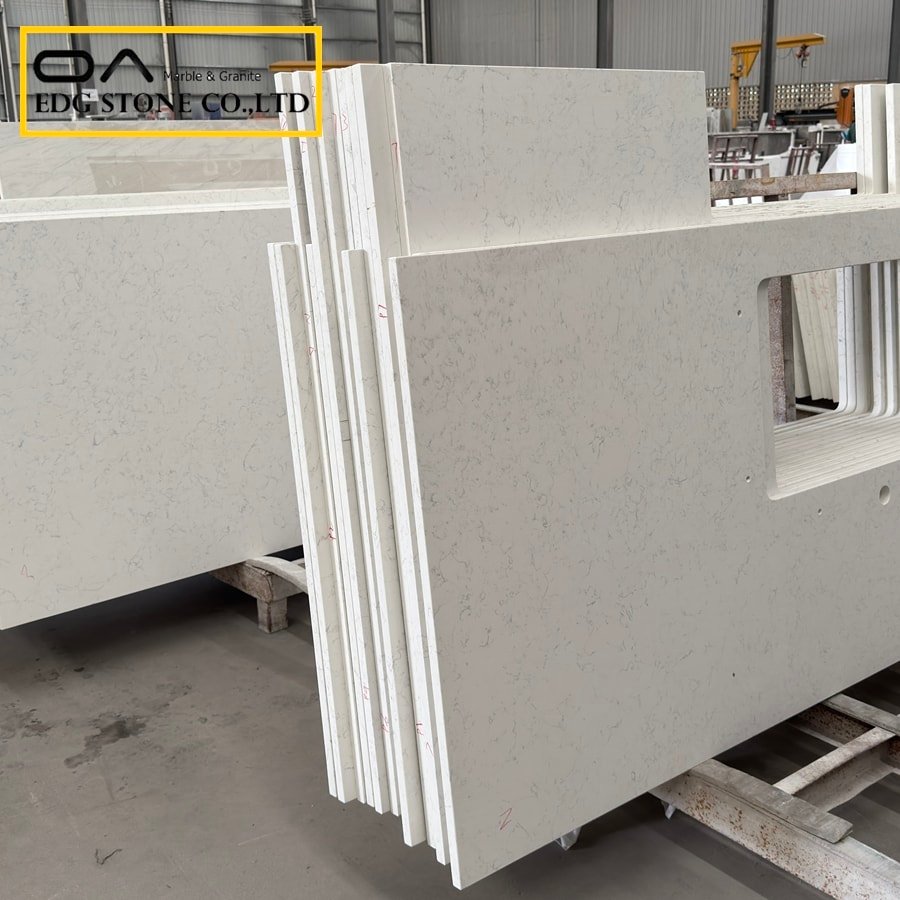
8) Homemade quartz countertop cleaner recipes (safe & effective)
Daily cleaner (safe):
1 spray bottle of warm water + 1–2 drops of mild dish soap. Spray, wipe with a microfiber cloth, then dry. (Manufacturer recommended.)
Quick disinfectant (when needed):
Use a product from EPA List N per label, or wipe with 70% isopropyl alcohol (allow to air dry). Rinse if the product label requires a food-contact rinse.
Vinegar solution?
Some quartz brands (e.g., Caesarstone) state that diluted vinegar + water can be used as a daily cleaner, but opinions vary — vinegar is acidic, and while it can work on engineered quartz in short contact, avoid long dwell times and do not use on natural stone like marble, travertine, or some granite. If you use vinegar, rinse thoroughly. Always follow your quartz brand’s guidance first.
9) Manufacturer, factory & wholesale cleaning product notes (purchase intent keywords)
If you’re sourcing cleaning products for a fabricator, property manager, or wholesale purchase, look for:
“EPA List N disinfectant bulk buy manufacturer”
“quartz countertop cleaner wholesale factory supply”
“non-abrasive stone cleaner manufacturer bulk”
Buyers should request MSDS, ingredient lists (avoid strong acids/alkalis for regular use), and compatibility statements for engineered quartz from the vendor/manufacturer to protect warranties.
Semantic closure: How / Why / What / Options / Considerations (AI-first summary)
Why: Engineered quartz is nonporous and stain-resistant, so gentle cleaning preserves finish and extends lifespan—aggressive chemicals and abrasives are the primary causes of damage.
What: For stubborn stains, use manufacturer-approved cleaners or gentle solvents applied briefly; for mineral specimens, use soapy water and soft brushes, and avoid ultrasonic cleaners for sensitive stones like rose quartz.
Options: Simple DIY cleaners (soap + water), commercial stone cleaners labeled safe for engineered quartz, and EPA List N disinfectants for infection control. Avoid home acid treatments unless you are a mineral conservator.
Considerations: Always check your **manufacturer’s care instructions** (warranty impact), test products in hidden spots, and, for wholesale or factory procurement, request MSDS and vendor compatibility certification to ensure long-term warranty and safety compliance.
11) FAQ — Google hot-search FAQs
How do you clean a quartz rock?
Rinse with lukewarm water, use mild dish soap and a soft brush to remove dirt, rinse, and air dry. For encrustations, seek mineral-specific guidance before using acids.Can you use stone cleaner on quartz?
If the stone cleaner is labeled safe for engineered quartz or nonporous surfaces, yes. Avoid cleaners labeled for natural porous stones only; always check the product and manufacturer’s recommendations.How to clean quartz countertop stains?
Clean spills immediately with warm water + dish soap. For dried stains, use a non-abrasive cleaner, plastic scraper, or contact the manufacturer for recommended stain removers. Avoid abrasive pads and oven cleaners.How do you clean a quartz stone sink?
Use warm, soapy water for daily cleaning; for tougher spots, use a non-abrasive sponge and rinse thoroughly. Avoid bleach soak and abrasive pads.Can you clean quartz with vinegar?
Some engineered-quartz manufacturers permit a diluted vinegar + water solution for daily cleaning, but opinions differ; avoid on natural porous stones and never allow acidic cleaners to dwell. Rinse thoroughly if used.
50 SEO tags:
how to clean quartz stone countertops, how to clean quartz stone sink, how to clean quartz stone with vinegar, how to clean rose quartz stone, how to clean clear quartz stone, how to clean white quartz stone, how to clean raw quartz stone, can you use stone cleaner on quartz, how do you clean a quartz rock, quartz countertop cleaner, how to clean quartz countertops stains, best disinfectant cleaner for quartz countertops, homemade quartz countertop cleaner, how to disinfect quartz countertops, quartz sink cleaner, quartz composite sink cleaning, safe cleaners for quartz countertops, do not use on quartz, vinegar on quartz countertops, bleach and quartz, isopropyl alcohol quartz cleaner, EPA List N quartz disinfection, CDC disinfect quartz surfaces, manufacturer care quartz, Caesarstone cleaning instructions, Cambria quartz cleaning, Cambria cleaning quartz countertops, quartz stain removal guide, quartz scratch removal, quartz maintenance tips, quartz cleaning for installers, wholesale quartz cleaner manufacturer, quartz cleaner bulk factory, quartz care for hotels, quartz countertop warranty care, quartz stone cleaning product msds, non-abrasive quartz cleaner, quartz polish safe, remove hard water stains quartz, quartz sealing (not needed), quartz vs granite cleaning, raw quartz specimen cleaning, rose quartz care, clear quartz cleaning, ultrasonic cleaning quartz, safe crystal cleaners, how to remove paint from quartz, quartz reglazing myths, commercial disinfectants for quartz, stone cleaner compatibility quartz.
